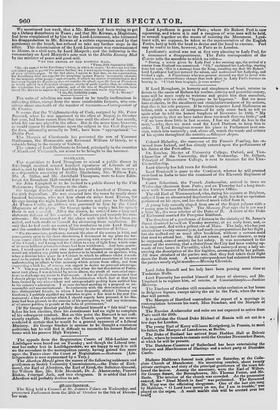SCOTLAND.
The requisition to Lord Brougham to attend a public dinner in Edinburgh received several hundred signatures of Liberals of all
shades, and by this time his Lordship has probably given his answer ; as a deputation consisting of Millie Macfarlane, Mr. William Tait, Mr. A. Millar, and Mr. Archibald Thompson, were to leave Edinburgh for Brougham flail several days ago.
Sir John Campbell is to be invited to a public dinner by the Fife Reformers; Captain Wemyss in the chair.
Sir George Sinclair dined with a party of a hundred at Thurso on the 20th Septeniber. Ile was escorted into the town by nearly dove hundred horsemen, who met him about six miles from Thurso, Sir George having the night before left Inverness and gone to Berridale. At Thurso Castle, an address was presented to him by the Chief Magistrate of the place. Sir George spoke in reply ; but his speech there is not r:-nttl tcd. After the dinner, he entered into a long and elaborate defence of his conduct in Parliament and towards his constituents. Ile complained of the abuse with which he had been assailed, and took credit to himself for abstaining from retaliation. . He said that he bad made no secret of his resolution to join Lord Stanley and the seceders from the Grey Ministry in the session of 1;31_
" On two occasions, gentlemen, towards the close of the session in 1834, and
consequently prior to the short dissolution, I denounced in my place the tortuous course which the Government wai pursuing with respect to the interests of thu Church ; and I compared the Cabinet to a ray of light front which some of its most brilliant prismatic colours had been withdrawn. And here, gentlemen. I would appeal to your own impartial and dispassionate judgment, and would ask whether any public man deserves to be branded as an apostate, who, then a division takes place in a Cabinet to which he adheres whilst it conti nued to be united, is led by the sober and disinterested conviction of his own understanding to adhere to that minority which retires from office, and from unsporting Which he, of course, can expect to derive no personal advantage. • 5 You may recollect, my friends, that When the last dissolution of Parliament took place, I was detained by severe illness, the result of unwearied exertions to discharge my duties in Pat liament. A few of the electors insisted that I should pledge myself to oppose the Administration which had at that time been formed by one whose talent and unimpeachable probity have entitled him to his country's admiration. I at once declined acceding to a proposal so unreasonable and unconstitutional. In conformity with the determination of my two distinguished friends, to whom I have frequently alluded (Stanley and Graham), I publicly signified my intention to give a fair trial to the new Government ; a line of conduct which I should eagerly have pursued, if his Majesty had been pleased, in the exercise of his prerogative, to call any statesman, of whatever politics, to preside at the helm of government."
[If Sir George Sinclair publicly declared himself a "fair trial" man
before his last election then his constituents had no right to complain of his subsequent conduct. But on this point the Baronet is not sufficiently explicit. His opinions on the Church question by no means rendered it certain that he would be a general opponent of a Liberal Ministry. Sir George Sinclair is anxious to be thought a consistent politician, but he will find it difficult to reconcile his former Radical votes with his present High Toryism.]


























 Previous page
Previous page